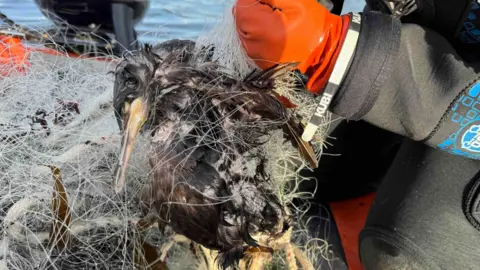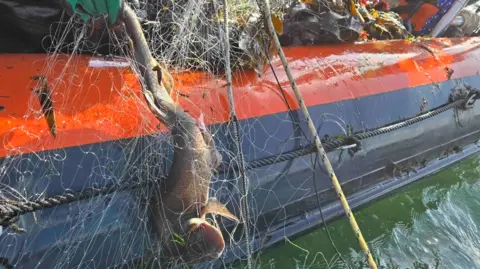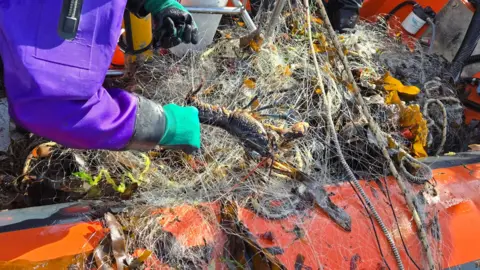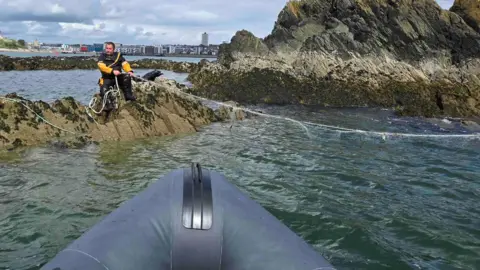Dozens of birds and fish die in 400m abandoned net
 Fathoms Free
Fathoms FreeVolunteers have spent five hours removing a 1,300ft-long (400m) abandoned fishing net from Plymouth Sound National Marine Park.
The net, which had trapped and killed dozens of fish, seabirds, crabs, and lobsters, was found at Drake's Island.
Birds are thought to have drowned after getting entangled as they dived for fish trapped in the net, which was retrieved on Monday.
"It was honestly one of the worst ones we've done in quite a long time," said Luke Bullus of Cornwall-based charity Fathoms Free.
 Fathoms Free
Fathoms FreeThe so-called ghost fishing gear - nets or other fishing gear lost, discarded or abandoned in the sea - was reported to Fathoms Free by concerned members of the public and the Devon and Severn Inshore Fisheries and Conservation Authority.
The team discovered the net was much larger than anticipated, stretching hundreds of metres underwater and entangling various marine life, including shags and an oystercatcher.
There were dozens of lobsters, dozens of edible and spider crabs of all sizes, wrasse, cat sharks, bull huss, and countless decomposing fish that were unidentifiable due to the condition they were in, acting as bait to the other marine life in the area.
No larger marine mammals such as seals or dolphins were found in the net.
 Fathoms Free
Fathoms FreeThe net's extensive length and entanglement with rocks and kelp made the task particularly challenging, said Mr Bullus.
He also admitted it was an emotional as well as physical task for all involved.
"The birds are quite hard-hitting because they would have drowned as they dived down to fish that they saw tangled in the net," he said.
The net's extensive length and entanglement with rocks and kelp "really tested the team's skills, experience, and stamina", he said.
More than 500,000 tonnes of fishing gear is estimated to be lost or abandoned every year in the world's seas and oceans, according to a report by conservationists Global Ghost Gear Initiative in 2020.
Plymouth Sound is the UK's first national marine park, a project which aims to engage the city's residents and businesses with the marine environment.
 Fathoms Free
Fathoms FreeFollow BBC Cornwall on X, Facebook and Instagram. Follow BBC Devon on X, Facebook and Instagram. Send your story ideas to [email protected].
